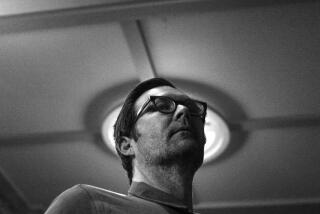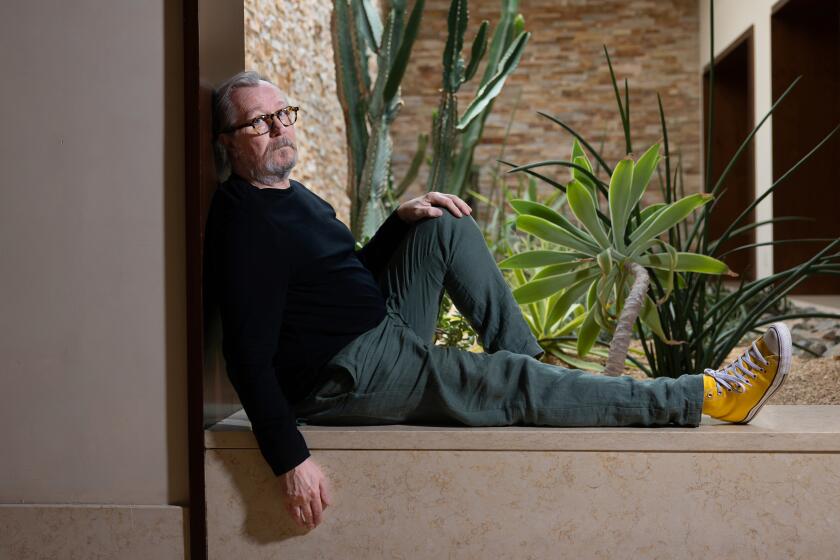‘Hitchcock’s’ triple play
The original title of director Sacha Gervasi’s “Hitchcock” was “Alfred Hitchcock and the Making of Psycho,” the name of Stephen Rebello’s book on which the film is based. Anthony Hopkins, who plays the famed filmmaker in the movie, thought the longer name was a terrible idea, sounding more like a symposium than a film — “I said to Sacha, ‘That’s a doomed title,” Hopkins said — and eventually Gervasi shared his actor’s opinion.
The plot’s real focus, said Gervasi, was not so much how Hitchcock filmed his most renowned work but rather what was happening in his personal and professional life off-screen. “The whole point of the movie is what we don’t know and didn’t see — it’s the untold story,” said Gervasi, who makes his narrative feature debut with “Hitchcock,” having previously been a screenwriter (“The Terminal”) and documentarian (“Anvil! The Story of Anvil”).
To dramatize the “untold story,” Gervasi worked with Rebello and screenwriter John J. McLaughlin to organize the story around Hitchcock’s crisis of confidence. Worried that younger directors were about to outshine him and that he’d become a television hack, the “North by Northwest” director decided he needed to make his most provocative movie yet, which would be “Psycho.” But the real scare in Hitchcock’s life wasn’t the gruesome deeds of serial killer Ed Gein; it was the state of his marriage to frequent collaborator Alma Reville (Helen Mirren).
BUZZMETER: “Hitchcock’s” Oscar chances
Gervasi’s vision for “Hitchcock” can be seen clearly in three key scenes, which combined cover the story’s sweep. Here’s how each sequence came together:
The tea party
Soon after deciding to adapt the book “Psycho” for his next movie, Hitchcock summons a group of high society types, film journalists and gossip columnists to his home. In addition to serving tea, Champagne and finger sandwiches (“They’re real fingers,” Hopkins purrs to his guests with merry malice), Hitchcock distributes a stack of Gein’s crime scene photographs. The photos depicted all sorts of horrors, including mutilated and headless bodies.
“The more people who are offended and upset, the more people will be interested in the film,” Gervasi explained of Hitchcock’s judgment. “He was taking great delight in shocking this audience.”
Because Paramount Pictures had refused to back “Psycho,” the director was financing the $800,000 production himself, mortgaging his home to raise the funds. (Gervasi was in part drawn to making “Hitchcock” because he self-financed “Anvil,” also mortgaging his home.)
As it plays in the finished film, the scene makes clear not only that “Psycho” is going to scare people, but also that its director is going to enjoy doing it. “Janet Leigh said of Hitchcock, ‘He’s one of the funniest men I’ve ever met,’” Hopkins said. “He had a wicked sense of humor.”
VIDEO: Envelope Screening Series
The shower scene
It’s “Psycho’s” most iconic scene — Norman Bates (played in the original film by Anthony Perkins, in Gervasi’s film by James D’Arcy) attacking Marion Crane (with Scarlett Johansson replacing Leigh) in a hotel shower with a knife. But in “Hitchcock,” the scene, particularly its staging, takes on a very different meaning. Dissatisfied with the sequence’s intensity, Hitchcock picks up the blade himself, and in a spasm of violence hacks through the air at Leigh like a crazed samurai, with fleeting images of all of his tormentors flashing in front of him.
“The idea was to explore what was in his mind — the overwhelming frustrations about mounting the film and his concerns over his wife,” Gervasi said. As he goes berserk, the director imagines he’s slashing at Barney Balaban, the Paramount executive who wouldn’t finance the film; Geoffrey Shurlock, the movie censor who intended to block “Psycho’s” release; and Whitfield Cook, the screenwriter with whom Hitchcock suspects his wife is having an affair.
Hopkins initially feared the scene might be “a bit over the top” but then came to see how it depicted visually what the director was feeling internally. “It just shows Hitchcock’s torment,” Hopkins said.
For Johansson, the sequence presented several challenges. She had to be mostly nude — “The best thing to do is go in head first and let everything else follow,” Johansson said of ditching her wardrobe — while also trying to be faithful to Leigh’s performance throughout the production.
“My goal is for [Leigh’s daughter] Jamie Lee Curtis and her sister to look at the movie and say, ‘That’s Mom,’” Johansson said. “And that takes a lot of reading and a lot of research. I never had to approach a role this way.”
A bit easier, perhaps, was her shower scene screaming — Hopkins gave her all she needed. “Tony was so devastating that day. He was so out of control — a controlled out of control — that when he pulled himself together at the end, everybody said, ‘Holy …! That was vicious.’ It was that intense.”
The wife strikes back
Reville was more than Hitchcock’s wife. She was in many ways his muse, his assistant, his editor (she had a number of credits on her husband’s films, including “Shadow of a Doubt”). But in “Hitchcock,” she’s also a thorn in the director’s side.
For all of Reville’s emotional and creative maintenance, Hitchcock sees her chiefly as a saboteur; he’s convinced she’s having an affair with Cook and isn’t sufficiently supportive of his filmmaking. At one point, he confronts her with his suspicions, prompting Reville to explain to her husband in exact and animated detail how helpful (and deferential) she’s really been to him and how selfish he’s become.
“Hitchcock is blind to what’s in front of him, and he doesn’t recognize the effect he’s having on people around him,” said Gervasi, who did some uncredited script rewrites, including Reville’s monologue here. “There are many, many women who stand by their creative or work-obsessed husbands. And then there’s a moment where they say, ‘Hey, wait a second!’”
AWARDS: Oscars 2013
Mirren, who had never previously acted opposite Hopkins, said the audience “has a longing to hear Alma say these words — to put up or shut up. She was never a doormat, but, on the other hand, we all make these sacrifices and compromises for our partners. And sometimes you have to claw back and reclaim some territory.”
Mirren said she very specifically remembers being ignored the way Reville was, especially when her husband, director Taylor Hackford, ran a small, independent movie company several years back, well before Mirren won her Oscar for “The Queen.”
“When you went to a party with him, it was a very humbling experience,” Mirren said. “People would just walk through you, elbow you aside, to be ingratiating to the man who might employ your actor or read your script. So in that way, [the monologue] comes from the heart.”
MORE COVERAGE
PHOTOS: Memorable red carpet moments
VIDEO: Highlights from the Envelope Screening Series
More to Read
From the Oscars to the Emmys.
Get the Envelope newsletter for exclusive awards season coverage, behind-the-scenes stories from the Envelope podcast and columnist Glenn Whipp’s must-read analysis.
You may occasionally receive promotional content from the Los Angeles Times.







